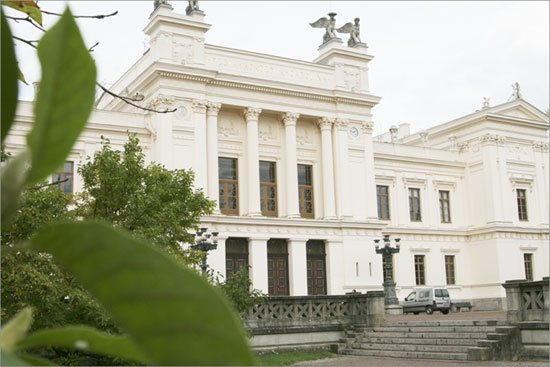The University no longer has money invested in the Russian oil company, Gazprom. After Lundagård’s observations, the University Board decided to switch funds.
In June, Lundagård wrote an article concerning the fact that the University was in possession of shares in the bank SEB’s Foreign Fund, – a fund of which the Russian oil company Gazprom was part. During the meeting at the University Board, held in the middle of June, it was decided that the University’s investments should be reviewed.
“The question concerning the complete liquidation of any investment in Gazprom was brought up”, Klemens Ganslandt, the donation manager of Lund University, says.
“The best thing would have been if SEB had changed their fund, but they could not guarantee that the investments in Gazprom would be sold within a near future. Therefore, we chose to sell our own investments in the Foreign Fund, and to invest the money in SEB’s Nordic Fund instead,” he says.
The total investment is around 3.7 million SEK. SEB’s Nordic Fund consists of Hennes och Mauritz, Saab and Investor, amongst others. The investment is administered by the University, in accordance with the donator’s wishes. The yield, in turn, is used in scholarships to students, for example.
Will review the rules
In connection with the University Board’s meeting, it was also decided that the rules for making investments should be reviewed. The purpose is to see how the rules can be adapted to fit with the aspirations of the University concerning the contribution to more sustainable development, and that the rules should be adapted according to the values of the University.
“I was assigned to investigate this in cooperation with GES Invest (an investment management company). At the meeting with the University Board in November, I will, hopefully, be able to give an account of the new investment rules, which will take into consideration the values of the University, as well as the aspect of sustainable development,” Klemens Genslandt says.
Has the University still got money invested in oil companies?
“As soon as you deal with index funds, oil companies are part of the fund portfolio; thus, at the moment, oil companies are part of such funds. The decision we arrived at in the meeting was that it was particularly inconvenient to have Gazprom shares, therefore, that fund was liquidated. It is up to the University Board where the money should be placed,” he says.
Gratifying with an investigation
One example of people who have raised the question concerning investments in oil companies is the organisation Fossil Free Lund University. Their goal is to influence the University not to have any investments in companies that, among other things, produce fossil fuels.
“It is very nice that they have sold their shares in Gazprom, and that the University is investigating its rules for making investments,” Lisa Brand, doctoral student and a driving force within the organisation, says.
“We will continue working with these questions in relation to the University. The important thing is the University’s attitude, that they want to make a difference through taking a stand against fossil fuels,” she says.
Text: Carl-Johan Kullving
Translation: Richard Helander






